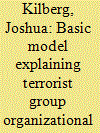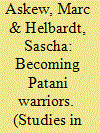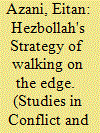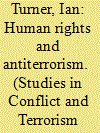| Srl | Item |
| 1 |
ID:
116224


|
|
|
|
|
| Publication |
2012.
|
| Summary/Abstract |
Terrorist groups strive to balance efficiency with their need for security. This article examines the factors that affect a group's choice of organizational structure. I classify 254 groups from the Global Terrorism Database into one of four basic structures: market, all-channel, hub-spoke, or bureaucracy. The results of a multinomial logistic regression reveal that as secret organizations, terrorist groups are not just driven by achieving efficiencies in their organization but rather by protecting against infiltration and threats. Internal factors such as target selection, operational pace, ideology, and stated goals shape a group's structure. External environmental factors such as political rights, civil liberties, polity durability, and state wealth also help shape a group's structure.
|
|
|
|
|
|
|
|
|
|
|
|
|
|
|
|
| 2 |
ID:
116223


|
|
|
|
|
| Publication |
2012.
|
| Summary/Abstract |
Focusing on the case of Thailand's ongoing insurgency in its southern Malay Muslim majority region, this article examines the circumstances surrounding individual's choices to engage in violent revolt and their conformity and non-conformity with the norms and disciplines of the movement in which they operate. Insurgent-driven violence in Thailand's southern border provinces has attracted considerable attention, but little has been published about the people who become "Patani Warriors" (juwae). Based on the authors' direct encounters with current and former insurgents and study of Thai official documentation and captured insurgent propaganda material, this article presents the most detailed information currently available on southern Thailand's shadowy fighters. We argue that there is no single type of Malay Muslim insurgent: this variegated reality defies the normative ideals projected in insurgent's indoctrination material while it also poses a challenge for the Thai authorities to define in simple terms those who oppose the state.
|
|
|
|
|
|
|
|
|
|
|
|
|
|
|
|
| 3 |
ID:
116221


|
|
|
|
|
| Publication |
2012.
|
| Summary/Abstract |
Since entering Lebanese politics in the 1990s, Hezbollah has defined itself as a political party that plays by the rules. Simultaneously, it has continued to use social assistance to win over Lebanon's Shi'ites while using violence to eliminate rivals. Through this strategy of "walking on the edge," Hezbollah has metamorphosed from an illegitimate terrorist organization into a legitimate political party heading Lebanon's government. An International Tribunal's recent indictment of four senior Hezbollah officials for involvement in the murder of former Lebanese Prime Minister Rafiq Al-Hariri provides an opportunity to understand how Hezbollah maintains this canny-and successful-balancing act.
|
|
|
|
|
|
|
|
|
|
|
|
|
|
|
|
| 4 |
ID:
116222


|
|
|
|
|
| Publication |
2012.
|
| Summary/Abstract |
In law freedom from torture and ill-treatment is "absolute," meaning that a state cannot infringe the right for purposes that would seem legitimate such as the protection of national security. However, with the growth in international terrorism, particularly suicide violence, should the freedom remain without limitation? This article considers legitimizing torture by reference to the "positive" legal obligation the right imposes on states to prevent harm to individuals by third parties such as terrorists. Assuming such a legal argument could be made out, it is questioned whether adopting such measures of interrogation would in fact outweigh the negative consequences that would inevitably follow from reversing accepted international standards for the protection of, say, detainees from ill-treatment in state custody.
|
|
|
|
|
|
|
|
|
|
|
|
|
|
|
|